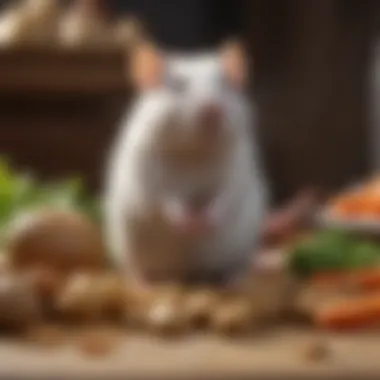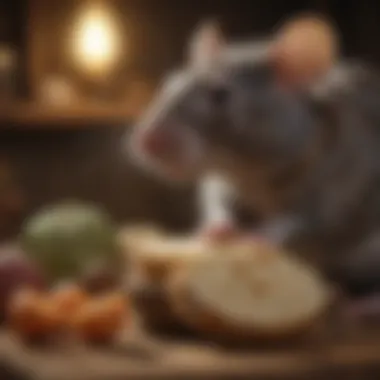Understanding Proper Nutrition for Your Pet Rats


Intro
Feeding pet rats involves understanding their specific needs. Proper nutrition is crucial for their health and longevity. This section will outline the essentials of rat care, focusing on their dietary requirements, food options, and how to maintain a balanced diet. It is an important topic for pet owners who want to ensure that their furry friends thrive.
Understanding Your Pet
Pet Behavior Basics
Rats are social and intelligent creatures. They display a range of behaviors that reflect their well-being. Understanding their behavior is key to meeting their needs. They communicate through body language, vocalizations, and scent marking. Observing these behaviors will help you provide a more fulfilling environment for them.
Common Breed Characteristics
Different rat breeds, such as the Fancy Rat, Dumbo Rat, and Rex Rat, have distinct traits. For instance, Dumbo Rats possess larger ears and a more docile temperament. Recognizing these characteristics can guide you in selecting food that aligns with their breed-specific tendencies.
Species-Specific Needs
Rats have unique dietary needs that differ from other pets. Their digestive systems require specific nutrients. A mix of carbohydrates, proteins, fats, vitamins, and minerals is essential. This balance maintains their health and supports their growth.
Pet Care and Maintenance
Feeding Guidelines
When establishing a diet for your pet rat, consider these feeding guidelines:
- Base Diet: Provide high-quality rat pellets. They contain essential nutrients that commercial foods supply.
- Fresh Food: Supplement pellets with fruits and vegetables. Options like carrots, apples, and leafy greens are beneficial.
- Treats: Offer treats sparingly, as high-sugar and high-fat foods can harm their health.
Grooming Essentials
Grooming your rats helps with bonding and hygiene. Regular brushing removes loose fur and minimizes odor. Also, check their nails and trim them if needed. Keeping their coats clean promotes a healthy lifestyle.
Hygiene Practices
Maintaining a clean environment is vital. Change bedding frequently to prevent odor and bacteria build-up. Sanitize food dishes and water bottles regularly. A clean habitat ensures your pets stay healthy.
Health and Wellness
Routine Vet Check-ups
Regular veterinary visits are essential. These check-ups allow for preventive care. Your vet can monitor health and provide advice on diet and care.
Vaccination Needs
While pet rats do not require vaccinations like dogs or cats, they can still benefit from advice regarding preventive treatments. Consult your vet for insights tailored to your rat's needs.
Recognizing Signs of Illness
Being aware of health issues is crucial. Common signs include lethargy, changes in appetite, and abnormal droppings. If these symptoms appear, consult a veterinarian promptly.
Enrichment and Activities
Indoor vs.
Outdoor Activities
Keeping rats stimulated is important. Indoor play can include obstacle courses made of cardboard or tunnels. Outdoor interactions should be closely supervised to ensure safety.
Interactive Toys and Games
Toys designed for gazing and chewing help keep rats entertained. For example, wooden blocks or tunnels encourage exploration. Engaging with your rats in play strengthens your bond.
Socialization Opportunities
Rats are social animals. They thrive on interaction with humans and other rats. Providing opportunities to socialize with other pets or humans can contribute greatly to their well-being.


Remember, a well-fed rat is a happy rat. Understanding their needs and behavior leads to better health and a more vibrant life.
Preface to Rat Nutrition
Understanding rat nutrition is fundamental for anyone committed to ensuring the well-being of pet rats. The dietary choices made for these small companions directly affect their health, behavior, and longevity. This section highlights the importance of proper nutrition and outlines the key components necessary to maintain a balanced diet for rats.
Rats have unique nutritional requirements that differ from other pets. As omnivores, their diet needs to consist of a variety of foods to meet both macronutrient and micronutrient needs. A well-rounded diet promotes not only physical health but also mental stimulation, as the variety of foods can satisfy their curiosity and foraging instincts.
Key Benefits of Understanding Rat Nutrition
- Enhanced Health: Proper nutrition reduces the risk of common ailments associated with poor diets, such as obesity or malnutrition.
- Behavioral Improvement: Adequate nutrition contributes to a more stable and active behavior in rats, which can lead to better interaction with their human companions.
- Longevity: A balanced diet makes a significant difference in the lifespan of pet rats. Rats tend to live longer and healthier lives when provided with the right nutrients.
Providing pet rats with appropriate food involves considering their specific dietary needs. Factors such as their age, health status, and activity level must be taken into account. It is important to remember that feeding practices evolve as these factors change. Thus, ongoing education about rat nutrition should be a priority for all pet owners.
“Nutrition is not just about food; it’s about understanding needs and responding accordingly.”
Basic Nutritional Needs of Rats
Understanding the basic nutritional needs of rats is fundamental in ensuring their health and well-being. Just like humans and other animals, rats require a balanced diet that provides all essential nutrients. A thorough knowledge of what constitutes their nutritional needs aids pet owners in making informed food choices that can positively impact the longevity and quality of life of their pets. Failure to address these needs can lead to serious health issues, underscoring the relevance of this topic.
Macronutrients: Proteins, Carbohydrates, and Fats
Macronutrients play a crucial role in a rat's diet. They are divided into three primary categories: proteins, carbohydrates, and fats. Each of these macronutrients serves specific functions that are vital for overall health.
- Proteins are essential for growth, repair, and maintenance of body tissues. They also contribute to the production of hormones and enzymes. Rats thrive on protein-rich foods, which include beans, legumes, and high-quality commercial rat pellets.
- Carbohydrates are a key energy source, necessary for daily activities. They come from grains, fruits, and vegetables. Ensuring an adequate intake of carbohydrates helps maintain energy levels and supports metabolic functions.
- Fats should constitute a smaller portion of their diet. However, fats are important for absorbing certain vitamins and providing energy. Sources of healthy fats for rats include nuts and seeds in moderation.
It's vital to balance these macronutrients in a rat's diet according to their age, size, and activity level to promote optimal health.
Micronutrients: Vitamins and Minerals
Alongside macronutrients, micronutrients are essential for maintaining a rat's health. Vitamins and minerals are crucial in preventing deficiencies and ensuring proper bodily functions.
- Vitamins help regulate metabolic processes and are important for the immune system. Rats need a variety of vitamins, such as Vitamin A for vision and skin health, Vitamin D for calcium absorption, and Vitamin C for immune support. Natural sources include fruits, vegetables, and specially formulated rat vitamins available on the market.
- Minerals, such as calcium and phosphorus, are important for bone health and metabolic functions. Adding calcium-rich foods like leafy greens can significantly contribute to their diet. A balanced intake of minerals helps maintain cellular function and overall wellness.
Ensuring that pet rats receive adequate vitamins and minerals is essential to prevent health issues, such as skin problems, growth deficiencies, and weakened immune systems.
A balanced intake of macronutrients and micronutrients is paramount for the well-being and longevity of pet rats.
By grasping the essential nutritional components for rats, pet owners can make educated choices about feeding practices that benefit their furry companions.
Foods to Avoid
Understanding which foods to avoid is essential for maintaining the health of pet rats. Certain foods can be toxic or harmful, leading to serious health issues. This section focuses on specific harmful items and their implications for rat nutrition. Pet owners must remain vigilant and informed about potential dangers in their pets' diets.
Harmful Fruits and Vegetables
Not all fruits and vegetables are safe for rats. Some may lead to severe reactions. For instance, citrus fruits like oranges and lemons can cause digestive upset in rats. They may also be too acidic for their systems.
Another concern is solanine, found in potatoes and tomatoes. This compound can be toxic if consumed in high amounts. Raw beans, particularly kidney beans, must also be avoided due to harmful toxins that can be lethal. Here is a list of other fruits and vegetables to refrain from feeding rats:
- Avocado: Contains persin, which is toxic to rats.
- Rhubarb: High in oxalic acid, harmful to their kidneys.
- Onion and Garlic: Can lead to blood abnormalities and organ damage.
By being informed about these harmful options, rat owners can make safer food choices, ensuring the well-being of their pets.
Processed Foods and Human Snacks
Processed foods often contain preservatives, sugar, and unhealthy fats. These ingredients can lead to various health issues for rats, including obesity and dental problems. Human snacks such as chips and cookies are especially dangerous. They provide little to no nutritional value and can disrupt a rat's dietary balance.
Foods that are high in sodium can affect a rat's hydration levels, leading to kidney strain. Sugary snacks can promote obesity and other metabolic disorders. It is critical for pet owners to avoid giving rats the following items:
- Chips: High in salt and unhealthy fats.
- Candy: Contains excessive sugar, negatively affecting their health.
- Fast Food: Often high in sodium and unhealthy oils.
In summary, processed and human snacks pose risks that can easily be avoided by sticking to a natural, rat-safe diet.


Toxic Foods: A Comprehensive List
Certain foods pose a direct threat to rat health. Each pet owner should be aware of these toxic substances to prevent accidental harm. Here is a comprehensive list of some well-known toxic foods to ensure rats do not ingest:
- Chocolate: Contains theobromine, which is lethal to rodents.
- Caffeine: Found in coffee and tea, it can cause hyperactivity and heart issues.
- Nutmeg: Affects the central nervous system and can be poisonous.
- Xylitol: A sweetener that is fatal for many animals, including rats.
- Alcohol: Can lead to toxicity and should always be avoided.
The health of your pet rat is closely linked to what they eat. Avoiding toxic foods is essential.
Ensuring a safe food environment is vital in keeping rats healthy and happy. By understanding and recognizing harmful foods, pet owners can contribute positively to their pets' overall well-being.
Feeding Frequency and Portion Sizes
Feeding frequency and portion sizes are vital aspects of rat nutrition that should not be overlooked. It is essential to establish an optimal feeding routine to maintain the health and well-being of pet rats. Rats have specific eating habits and preferences, which directly influence their growth, energy levels, and overall happiness.
Understanding the rhythm of a rat's feeding behavior allows owners to tailor their feeding practices accordingly. If you provide the right portions at appropriate intervals, you can significantly reduce issues like obesity or malnutrition in your pets. This section covers the basic elements, benefits, and considerations related to feeding frequency and portion sizes.
Understanding Rat Feeding Behaviors
Rats have a natural instinct for foraging, and their feeding behaviors reflect this. In the wild, they typically consume small amounts throughout the day rather than gorging themselves at one time. This is an important consideration for pet owners, as replicating this behavior can lead to a healthier lifestyle for domesticated rats.
Key points to recognize include:
- Mini-meal approach: Offering smaller portions multiple times a day can mimic their natural feeding patterns and help prevent overeating.
- Social feeding habits: Rats tend to eat in groups, so consider the dynamics if you have multiple rats. They may compete for food, leading to unequal portions.
- Food preferences: Observe what your rats enjoy and offer a variety of options to keep them engaged.
By taking into account these behaviors, owners can create a feeding schedule that promotes healthy eating habits.
Daily Portion Recommendations
The quantity of food given to your rat plays a significant role in maintaining their health. An ideal portion size largely depends on the rat's age, weight, and overall health. However, some general guidelines can help pet owners determine the right amount of food for their pets.
A few useful recommendations include:
- Adult rats: Approximately 1 ounce (about 30 grams) of high-quality rat pellets per day. This serves as the base of their diet.
- Treats and extras: Limit additional foods such as fruits or vegetables to no more than 10% of the total daily intake.
- Observe body condition: Regularly check the weight and health of your rats. If they seem to gain weight rapidly, reduce the portion sizes.
It's critical to monitor your rats closely. Changes in their eating habits can indicate health issues requiring immediate attention.
By establishing a well-structured feeding routine and adjusting portion sizes based on the individual needs of each rat, pet owners can optimize their pets' nutrition and support their overall well-being.
Hydration Essentials
Hydration is a fundamental aspect of rat care that is often overlooked. While many pet owners focus primarily on solid food, providing adequate water is equally important for the overall health and well-being of their rats. This section outlines why hydration matters and offers practical advice for ensuring your pets remain properly hydrated.
Importance of Clean Water
Rats, like all animals, require clean water for various physiological processes. Water aids in digestion, nutrient transport, and temperature regulation. A constant supply of clean, fresh water supports healthy organ function, prevents dehydration, and reduces the risk of related health issues.
Dirty water can lead to bacterial growth and contamination, resulting in gastrointestinal issues. Furthermore, stagnant water, often found in poorly maintained containers, poses a risk of disease. Therefore, ensuring that your rat has access to clean water is crucial for preventing potential health problems and promoting their longevity.
Clean water is as vital to a rat's health as balanced nutrition, and pet owners must ensure it is always available.
Hydration Tips and Recommendations
To maintain proper hydration for your pet rats, consider the following tips and suggestions:
- Use Water Bottles: A water bottle with a spout helps keep water clean and prevents spillage. Ensure the bottle is easy to use for your rats and positioned correctly in the cage.
- Change Water Daily: Refresh the water supply every day. This simple act can significantly impact their health. Additionally, check the bottle for any blockages that may prevent flow.
- Monitor Consumption: Pay attention to your rats’ water consumption. If you notice a sudden increase or decrease, it might indicate a health issue requiring veterinary attention.
- Provide Additional Sources: While water bottles are effective, some rats enjoy drinking from shallow dishes. Use a heavy bowl to keep it from tipping over, and refill it regularly.
- Consider Hydration During Heat: In warmer environments, ensure that your rats have extra water available. An increase in temperature can lead to dehydration.
Providing clean and accessible water ensures optimum health for rats. Addressing their hydration needs contributes to their overall well-being and encourages a longer, healthier life. Always prioritize their hydration alongside nutrition to foster a robust and thriving pet.
Common Dietary Issues in Rats
Understanding common dietary issues in rats is essential for any pet owner. The health of your rat highly depends on nutrition. Poor feeding practices can lead to various health problems, such as obesity and digestive disorders. Recognizing and addressing these issues can enhance your pet's quality of life.
Obesity: Causes and Solutions


Obesity is a prevalent issue among pet rats. It occurs when there is an imbalance between the calorie intake and energy expenditure. Several factors contribute to obesity in rats. Predominantly, overfeeding and lack of exercise play vital roles.
Causes of Obesity
- Overeating: Pet rats often depend on their owners for food. Many owners may not measure portions correctly, leading to excessive intake.
- High-Calorie Foods: Feeding rats too many seeds and fatty treats can increase their caloric intake significantly.
- Sedentary Lifestyle: Rats require mental and physical exercise. Without enough activity, they may gain weight.
Solutions to Obesity
- Portion Control: Measure out food daily, and limit high-calorie goodies. Use a scale or measuring cups to ensure accuracy.
- Encourage Activity: Provide toys and structures in their cage that promote climbing and playing. You can even engage them in playtime outside their cage in a safe space.
- Consulting a Vet: A veterinarian can give advice on a proper diet and might create a weight management plan for your rat.
Digestive Problems: Symptoms and Treatments
Digestive issues are another common concern. Rats can suffer from a variety of gastrointestinal problems. Symptoms may include diarrhea, bloating, or lack of appetite. Early detection is key to effective treatment.
Symptoms to Watch For
- Diarrhea: Loose stools can indicate an unhealthy diet or possible infections.
- Weight Loss: If your rat is losing weight rapidly, it may be due to digestive issues.
- Vomiting or Odd Stool: Changes in fecal consistency or occurrence of vomiting can also signal trouble.
Treatment Options
- Dietary Assessment: Analyze their current diet. Remove any unsuitable foods and introduce healthy options gradually.
- Hydration: Ensure access to clean water, particularly if diarrhea is present. Dehydration can worsen any digestive issue.
- Veterinary Support: A vet can run necessary tests to determine underlying causes and prescribe appropriate treatments.
Addressing and managing these common dietary issues is pivotal for the well-being of your pet rat. A balanced diet, combined with regular vet check-ups, ensures a healthy and happy life for your small companion.
Supplemental Feeding Practices
Supplemental feeding is a significant practice for owners who want to ensure their rats receive all essential nutrients. While commercial rat pellets and a balanced diet are fundamental, certain situations may warrant the introduction of supplements. The practice can help fill nutritional gaps, address specific health concerns, or enhance the overall quality of your rat's diet. However, it is crucial to approach this practice thoughtfully, keeping in mind both benefits and potential pitfalls.
When to Consider Supplements
There are specific circumstances when considering supplements for your rat may become necessary. Firstly, if your rat is recovering from illness, providing added vitamins or minerals can support the healing process. Secondly, breeding rats might require additional nutrients to guarantee both mother and offspring are healthy. Thirdly, older rats can experience increased nutritional demands due to changes in metabolism. In such cases, supplements can assist in safeguarding their vitality. Always seek professional advice before beginning any supplement regime to ensure it aligns with your rat's needs.
Types of Supplements for Rats
There are various kinds of supplements available for pet rats, each serving unique functions. Common types include:
- Vitamin Supplements: These provide essential vitamins that might be lacking in their regular diet. For example, Vitamin C is crucial for overall health.
- Mineral Supplements: They contribute vital minerals like calcium, which is important for bone strength.
- Probiotics: These can help improve gut health, especially for rats with digestive issues.
- Fatty Acid Supplements: Omega-3 and Omega-6 fatty acids support skin and coat health.
Using the right supplements can enhance your rat’s well-being. Always monitor their response to any new supplement to detect potential allergic reactions or other adverse effects.
It’s essential to consult with a veterinarian before introducing any dietary supplement to ensure its necessity and safety.
Behavioral Impact of Diet
A pet rat's diet does not just affect its physical health but also significantly impacts its behavior. Understanding the connection between the food they consume and their demeanor can help owners make informed choices that promote better well-being and mental health for their pets. When rats receive a balanced diet rich in appropriate nutrients, they tend to exhibit positive behaviors such as increased activity levels, social engagement, and cognitive function. Conversely, a poor diet may result in lethargy, aggression, or anxiety.
A good diet supports optimal brain function. Nutritional deficiencies can lead to behavioral issues, including irritability and reduced sociability. Therefore, providing suitable foods is crucial for maintaining a rat's emotional balance.
Link Between Nutrition and Behavior
The relationship between nutrition and behavior in rats is complex yet essential. Numerous factors contribute to this link:
- Nutrient Composition: Food rich in proteins, healthy fats, and complex carbohydrates supports the synthesis of neurotransmitters. These neurotransmitters play a vital role in regulating mood and behavior.
- Gut Health: An imbalance in diet can lead to digestive problems, affecting gut bacteria. Healthy gut microbiota is crucial for emotional well-being as it can influence mood and anxiety levels.
- Mineral Imbalance: Minerals such as magnesium and calcium can affect nervous system function. An imbalanced diet may lead to increased stress levels and irritability.
"Understanding the role of diet in a rat's behavior can help improve both its happiness and health."
Rats are social creatures and their food can also impact their interaction with other pets or people. A diet inadequately rich in essential nutrients can foster aggression or fearfulness. Owners should prioritize high-quality, species-appropriate food to ensure emotional and psychological health.
Selecting varied food sources, including fruits, vegetables, and proteins, can lead to enrichment and curiosity in pet rats. They thrive on exploration, and when food options are diverse, rats are more likely to engage in normal foraging behavior.
The End: Strategies for Optimal Rat Nutrition
In the journey of ensuring an optimal diet for pet rats, it becomes crucial for owners to grasp the key strategies that underpin their nutrition. The complexity of what constitutes a healthy diet cannot be overstated. A well-balanced diet enhances not just physical well-being but also contributes to a more vibrant and enriched life for these animals.
Importance of Balanced Nutrition
First and foremost, it’s fundamental to comprehend that rats, with their unique digestive systems, require a mixture of proteins, carbohydrates, fats, vitamins, and minerals. Ignoring this balance can lead to various health issues including obesity and malnutrition. Regular assessment of their food intake is advisable. Each rat's individual needs may vary based on age, activity level, and health conditions.
Variety and Portion Control
Another aspect of optimal nutrition is variety. Incorporating different food types—such as fresh fruits, vegetables, and occasional protein sources like nuts or insects—keeps their diet exciting and offers a range of nutrients. However, portion control is equally important. Pet owners should ensure that the amount of food offered aligns with the rat's consumption, preventing overfeeding and reducing waste.
Developing a Routine
Developing a feeding routine can also have positive effects. Scheduling regular feeding times fosters a sense of security and predictability for the rats. Keeping water fresh and available at all times is another critical component. Dehydration can quickly affect their health, so regular checks on hydration should be part of an owner’s daily routine.







